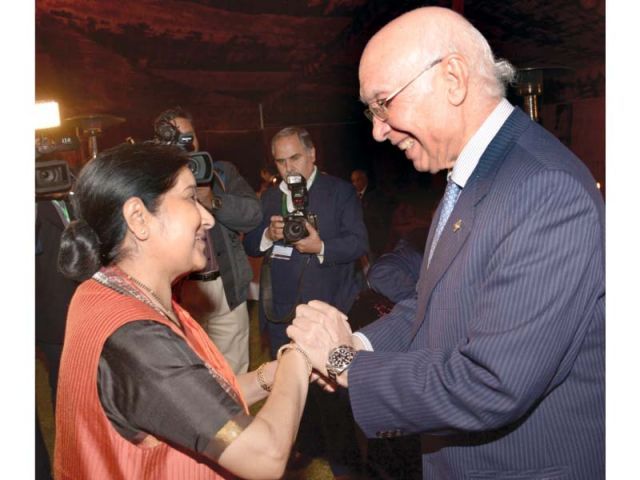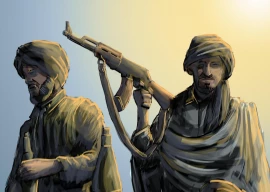
A day after Pakistan and India announced plans to resume the stalled composite dialogue, Imran Khan’s Pakistan Tehreek-e-Insaf (PTI) and the government’s ally Jamiat Ulema-e-Islam (JUI-F) on Thursday expressed concern over the joint statement of the bilateral meetings with the Indian foreign minister, and urged the government to take parliament into confidence.
During Thursday’s proceedings in the National Assembly, Dr Shireen Mazari of PTI asked the government to explain to the lower house why India had renamed the composite dialogue as ‘comprehensive dialogue’ and what was the impact of holding the talks “from scratch”.
India, Pakistan agree to resume comprehensive dialogue
“If dialogue is to be resumed from scratch then what will happen to the points which had been agreed upon during different stages of composite dialogue.”
She pointed out that while the joint statement had mentioned the Mumbai attack, it had omitted the Samjhota Express attack.
Shafqat Mehmood of the PTI went on to ask, “What is the motive behind India’s move to rename the dialogue and mention the Simla Accord?” He demanded that the Adviser to the Prime Minister on Foreign Affairs Sartaj Aziz brief the house on whether Islamabad had been asked by Delhi not to raise the Kashmir issue at the United Nations.

Mehmood also asked why the issue of restoring cricketing ties between the two countries was not raised during the bilateral meetings with Sushma Swaraj in Islamabad.
India's foreign minister to visit Pakistan for first time since 2012
Speaking on a point of order, JUI-F chief Maulana Fazlur Rehman said that the Simla accord had not stopped Pakistan from raising the Kashmir issue at international forums.
Head of the National Assembly’s Kashmir Committee, Rehman regretted that the joint statement had failed to mention Pakistan’s complaints and reservations. He joined a chorus of demands by MNAs for a briefing on Sushma Swaraj’s visit. Speaking about the Heart of Asia Conference which concluded on Wednesday, the JUI-F chief remarked that some hidden hands were keeping peace from materialising.
Meanwhile, Leader of the Opposition Khursheed Shah of the Pakistan Peoples Party refused to debate May’s presidential address to parliament in protest over the absence of the prime minister and members of his cabinet.
Afghans, Pakistan hold firm on ties; India ‘extends hand’ to Pakistan
“I will not speak on the presidential address, unless the leader of the house comes to parliament,” Shah said before leaving the assembly building.
Earlier, NA Speaker Sardar Ayaz Sadiq had suspended proceedings of the house for over 45 minutes after Jamshed Dasti had pointed out “incomplete quorum”.
Child abuse, pornography criminalised
The lower house of parliament also passed the Criminal Law (Amendment) Bill, 2015 which aims at protecting children from cruel treatment and abuse.
Pakistan, India NSAs discuss LoC, Kashmir issue in Bangkok
Piloted by Law and Justice Minister Pervaiz Rashid, the bill will amend the Pakistan Panel Code, 1860 and the Code of Criminal Procedure 1898. It raises the minimum age of criminal responsibility from seven to 10 years of age, and increases the upper age limit from 12 to 14 years of age. Further, the act will protect children from cruel treatment, criminalises child pornography and proposes punishments, especially for exposing children to obscene material and trafficking.
Dr Mazari, Nafisa Shah, Shazia Marri and Dr Azra Fazal said the upper age limit for punishing juveniles should be revised from 14 years of age to 16 years of age. Mehmood Khan Achakzai intervened to say that the bill should protect one from abuse at any age. The bill had previously been passed by unanimous vote in the standing committee.
Published in The Express Tribune, December 11th, 2015.

1732071267-0/lana-(2)1732071267-0-165x106.webp)
1727242355-0/Diddy-(1)1727242355-0-165x106.webp)

1732063440-0/elon-(3)1732063440-0-165x106.webp)
1732011525-0/Express-Tribune-(8)1732011525-0-270x192.webp)



1732080054-1/Copy-of-Untitled-(48)1732080054-1-270x192.webp)







COMMENTS (2)
Comments are moderated and generally will be posted if they are on-topic and not abusive.
For more information, please see our Comments FAQ